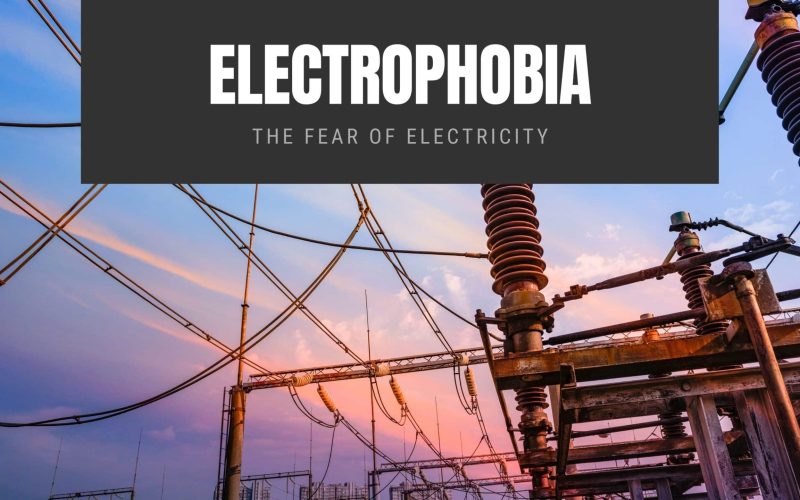Electrophobia can be described as the fear of electricity. The disorder can be triggered by traumatic experiences in the past relating to electricity.
This may include getting shocked or seeing someone get shocked.
Causes
Multiple reasons trigger or cause the fear of electricity. But the most distinguished ones are:
Upbringing
People who have electrophobia may have been raised by people who either have a transmitted sense of uncertainty or danger related to electricity or are generally just afraid of almost everything. Such people have a high tendency to experience electrophobia.
Past Experience
Electrophobia might be induced by people who might have experienced a bad or traumatic past with electricity.
Genetics
A person’s family lineage could have a phobia of electricity. Due to genetics and beliefs, this fear is likely passed down from one generation to another.
Symptoms
Phobias shouldn’t be brushed aside. All phobias can limit a person’s day-to-day activities and are, in some ways, the reason many people go through different bad experiences that may include anxiety and depression, which could lead to death.
People who have electrophobia purposely avoid coming into contact with what triggers them to experience anxiety or fear.
A person doesn’t need to be in situations that expose them to electricity to experience electrophobia. The brain doesn’t have to experience that situation to manifest the symptoms of panic.
A person’s brain can react to frightening situations even when the subject is not in or yet in that situation.
Different people are affected by various types of phobias. So, the symptoms vary, depending on the severity and suffering of the individual experiencing these fears.
Generally speaking, specific fears and phobias, such as electrophobia, are classified under a group of anxiety disorders. In other words, a person can experience any, if not all, of the below physical or psychological symptoms.
Physical Symptoms of Electrophobia
People with a fear of electricity or electrophobia often have panic attacks. These panic attacks can be extremely frightening for the person suffering from them—these symptoms, most of the time, pop up suddenly without any warnings or prior signs.
No matter how overwhelming the feeling of anxiety is, a panic attack can cause some physical symptoms that may include:
- Trembling
- Sweating
- Shortness of breath or difficulty breathing
- Hot flushes or chills
- Rapid heartbeat (tachycardia)
- Choking sensation
- A feeling of butterflies in the stomach
- Headaches and dizziness
- Nausea
- Numbness or pins and needles
- Dry mouth
- The need to use the toilet
- Fainting spells
- Confusion or disorientation
- Ringing in your ears
- Chest pain and difficulty breathing/tightness in the chest
- Hyperventilation
- A rise in blood pressure
Psychological Symptoms of Electrophobia
There are few severe cases where people suffering from panic attacks are triggered by electrophobia. It usually occurs when exposed to its triggers, such as electricity.
Such people can have one or all of the following symptoms:
- Fear of fainting
- Fear of losing control
- Fear of dying
- Feelings of dread
- Guilt, shame, self-blame
- Fear of harm or illness
- Feeling sad or hopeless
- Withdrawing from others
- Confusion, difficulty concentrating
- Feeling disconnected
- Anxiety and fear
- Anger, irritability, mood swings
- Depression
In some instances, there may be people who go through intertwined phobias. Such conditions may also be called “Complex phobias.” These can hurt a person’s mental wellbeing and everyday life routine.
They may limit someone’s life to the extent that they become incapable of living a normal social and personal life. It can also trigger a chain reaction to the symptoms mentioned above.
Treatment
Most individuals who are suffering from electrophobia do their best to avoid the object of their fear so they don’t feel the need to treat themselves.
People who have electrophobia feel a sense of control over their problems when they avoid the source of their situation.
Although it may work sometimes, avoiding something as essential as electricity might be nearly impossible.
Seeking professional help when possible is very important and is the best solution to such situations.
This way, you do a better job of understanding what is happening. Understanding what you are going through can help you move on. It can also equip you to face your fear of electricity at your own pace.
There is no medication for all phobias, although most of them are curable. Most therapists suggest that the possibility of such techniques to work strongly depends on the severity and suffering of the person experiencing the phobia.
Various cases have also been recorded where treatments are used to treat a particular phobia.
Some of the treatments used for most phobia cases may include:
Cognitive Behavioral Therapy (CBT)
CBT treatments stand on the notion that what we think and perceive is constantly compelling our behavior. Experiencing distress and anxiety are, in some cases, bending and distorting one’s understanding of reality.
The objective of cognitive behavioural therapy is to determine whether beliefs are accurate descriptions of reality. If they are not, strategies are employed to challenge and overcome them.
For instance, when someone is experiencing electrophobia, CBT can be used to determine if the fear and anxiety experienced by electricity is an accurate description of reality.
Cognitive behavioral therapy can be used to:
- Help you resolve complex feelings or help you find ways to deal with them.
- Help you identify unhealthy patterns in the way you think or act and find ways to change them (if you want to)
- Help you make sane reasons for things and have a better understanding of yourself.
- Give you a haven to converse with someone who doesn’t judge people
Medication
Medication should never be taken without a doctor’s prescription. In general, medication is not recommended for subduing phobias. Therapies have resulted in being the best way to triumph over fears.
However, certain types of medication are prescribed as short-term solutions to the side effects of phobias, which may include depression and anxiety.
There are three types of medication recommended for treating anxiety, and they include:
- Tranquillizers
- Beta-blockers
- Antidepressants
Self-help With Electrophobia
One of the best ways to prevail over any difficulty is to take good care of oneself. Knowing how to help yourself is vital, not just to control your fear of electricity but also to control other phobias and anxieties before they become severe.
If you feel you are experiencing any form of phobia, self-medication is ill-advised and should be avoided entirely. Consultation with your doctor or therapist is best done beforehand.








